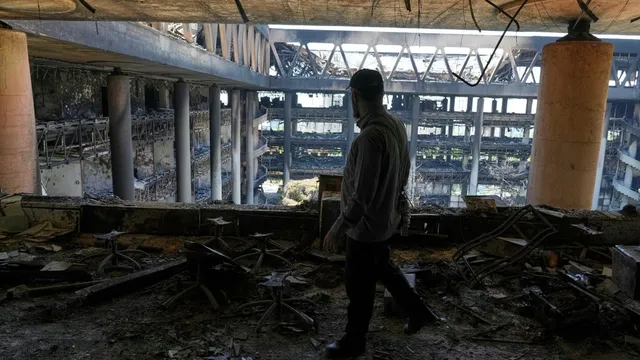
Israel targets Iranian state broadcaster amid escalating conflict
2025-06-20 09:30- The Israel Defense Forces launched an airstrike on the headquarters of Iran's state broadcaster during a live television broadcast.
- Prior to the strike, the IDF had issued evacuation warnings to civilians in the area, emphasizing their efforts to minimize civilian harm.
- This act marks a significant escalation in the conflict between Israel and Iran, highlighting the targeting of Iranian propaganda operations.
Express your sentiment!
Insights
On June 16, 2025, Iran experienced a significant escalation in ongoing military conflicts when the Israel Defense Forces (IDF) attacked the headquarters of the Islamic Republic of Iran Broadcasting (IRIB) during a live broadcast in Tehran. The incident occurred as part of Israel's broader series of airstrikes targeting Iranian military infrastructure. In the wake of recent missile exchanges and attacks, the IDF had previously warned residents in the area to evacuate, signaling an intentional strategy to minimize civilian casualties while delivering blows to Iranian military capabilities. The strike not only represented a physical attack but also a symbolic gesture against Iran's state media, which Israel considers a tool of propaganda for the Iranian regime. Israeli officials, including Defense Minister Israel Katz, had made previous statements predicting the impending disappearance of Iranian propaganda operations, framing the attack as necessary for Israel's national security and asserting its commitment to degrading Iranian influence in the region. Amidst the chaos, broadcast footage captured moments of disbelief and panic as news anchors at the IRIB fled from the studio while debris fell. This incident highlighted the volatility of media operations within conflict zones, especially as global audiences witnessed a strategic military operation unfold live. Within minutes of the strike, Iran's state-run media resumed programming, attempting to reclaim control of the narrative despite the attack that had just occurred. The broader conflict, which has already resulted in significant casualties on both sides, reflects the escalating tensions between Iran and Israel. Israeli airstrikes have killed hundreds in Iran, with Iranian responses claiming lives in Israel. As military actions continue, with recent Israeli assaults targeting critical infrastructure like oil refineries, analysts speculate about the potential consequences on regional stability, energy supplies, and international diplomatic relations. Observers now await how this attack on Iranian media will influence the dynamics between the two nations and the perceptions of citizens both in Iran and around the globe.
Contexts
The historical context of Israel-Iran tensions is rooted in a complex interplay of geopolitical interests, ideological differences, and regional dynamics. Following the establishment of the State of Israel in 1948, relations between Israel and its neighbors, including Iran, have been fraught with conflict and suspicion. Initially, Iran's monarchy under Shah Mohammad Reza Pahlavi maintained a relatively cordial relationship with Israel, as both were aligned against the influence of Arab nationalism and communism during the Cold War. However, this dynamic shifted dramatically after the 1979 Islamic Revolution in Iran, which led to the ousting of the Shah and the establishment of a theocratic regime that openly opposed Israel's existence and Western influence in the region. This ideological turn marked the beginning of hostilities between the two nations as Iran began to support groups and movements that were committed to the destruction of Israel, such as Hezbollah in Lebanon and Hamas in the Palestinian territories. The rise of Iran's nuclear program has further exacerbated tensions, as Israel perceives a nuclear-armed Iran as an existential threat. Following the 2002 allegations regarding Iran's secretive nuclear activities, Israel began lobbying for international action against Iran, fearing that the potential for a nuclear weapon would embolden Iran's regional ambitions and lead to increased proxy violence against Israel. The situation intensified after the 2015 Iran nuclear deal (JCPOA), which Israel vehemently opposed. Israeli officials argued that the deal would not sufficiently curtail Iran's nuclear capabilities and would provide the regime with significant financial resources to further its military and proxy operations throughout the Middle East. In recent years, Israel has adopted a more aggressive stance towards Iran, leading to a series of covert operations aimed at undermining Iran's nuclear program, as well as military strikes against Iranian positions in Syria to prevent the transfer of advanced weaponry to Hezbollah. Iran, for its part, has increased its military presence in Syria and has continued to fund and arm militant groups that threaten Israel, further fueling the cycle of escalations. Both countries have engaged in a range of asymmetric warfare, including cyberattacks, espionage, and propaganda campaigns as they attempt to undermine each other's influence without escalating into an outright war. The rising tensions have also drawn in other regional and global powers, complicating the landscape further. As of mid-2025, the geopolitical environment remains tense, with Israel continuing to prioritize countering Iranian influence as a core aspect of its national security policy. The prospect of renewed negotiations regarding Iran's nuclear program remains uncertain, with both sides entrenched in their respective positions. The ongoing discord has broader implications for Middle Eastern stability, affecting alliances and rivalries throughout the region. The enduring animosity between Israel and Iran illustrates the challenges of navigating historical grievances, regional ambitions, and the delicate balance of power in a volatile geopolitical landscape.